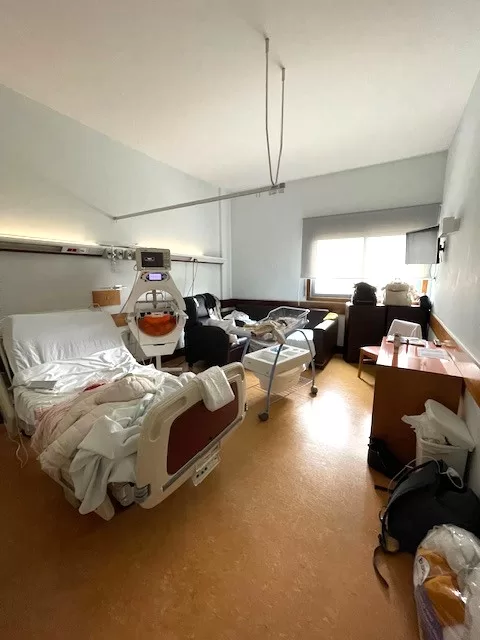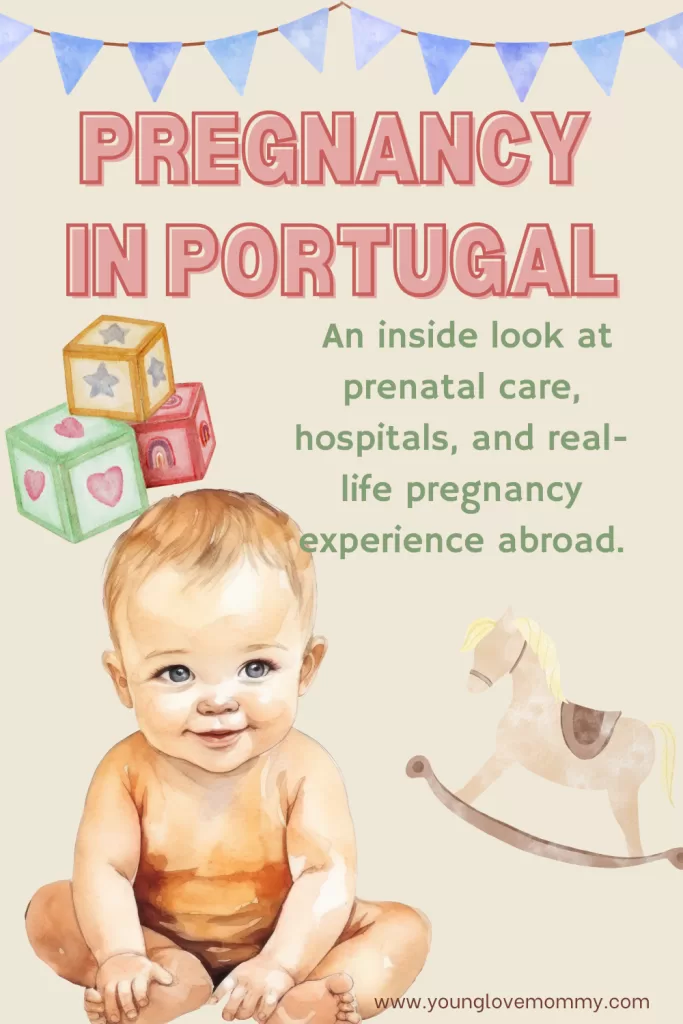
🍼If you had told me a few years ago that I’d be experiencing pregnancy in Portugal — at 41 going on 42 years of age, no less — I probably would’ve laughed and shaken my head.Yet here I am, expecting baby number three, living in Europe, and navigating a completely different prenatal care system than I ever knew in the U.S.
This is my third pregnancy and my second in Portugal. Even though I had some idea of what to expect, I’m still learning and noticing new things. I thought it might be helpful to share not just the emotion and joy of this season, but also what prenatal care looks like here — especially if you’re coming from another country like the U.S.
From how appointments are structured to the differences between public and private care, cultural quirks, and little surprises along the way — here’s a look at my personal experience and what you might expect if you’re also planning to have a baby in Portugal.
🩺 How Prenatal Care Works in Portugal (Private System)
One of the first things I learned during my first pregnancy in Portugal is how important it is to act early when booking care
I’m currently 16 weeks pregnant, with a due date in mid-September. Like many women in Portugal, I chose private care for my prenatal journey. While public care (through the SNS) is free and generally good, it often comes with long wait times and limited availability — especially in smaller towns or rural areas like where we live on the Silver Coast.
Finding a private OB/GYN who’s accepting patients can also be tricky. I’ve found there’s a surprising lack of availability compared to the U.S. Still, once you do find someone, the care tends to be more personal and flexible.
I returned to the doctor who delivered our last baby, but since he no longer attends births, I’ll switch to a different doctor closer to my due date — someone who will actually be available to deliver.
My routine appointments take place in either Lourinhã or Alcobaça, depending on the type of scan or consultation I need. The timing of ultrasounds and bloodwork mostly lines up with what I remember from the U.S., though the strictness around “12-week appointments” feels looser here — finding a doctor with availability often just comes down to luck. So far, I’ve been lucky!
So far, I’ve had a confirmation scan, bloodwork, and an early screening ultrasound. I have another appointment coming up this week and a morphology scan in the next few weeks.
🏥 Public vs. Private Hospitals During Pregnancy in Portugal

Many women in Portugal choose to give birth in public hospitals, which are free under the SNS and usually well-equipped. However, the experience can vary greatly depending on the region. You may not get a private room, and there’s no guarantee that the same doctor who followed your pregnancy will be there for the delivery.
We live near a public hospital in Caldas da Rainha, but in my opinion, it isn’t well maintained. Rooms are shared, and oddly enough, the maternity unit closes on specific days. That felt too unpredictable for me, so just like last time, we’ve decided to deliver in Lisbon.
Since the hospital where I gave birth to my daughter has since closed its maternity ward, I’ll be delivering at a different private hospital this time around.
Private hospitals usually offer shorter wait times, more personalized care, and better amenities (Food was delicious) — which matters a lot when you have two older kids at home. Of course, private care comes at a cost, but many expats feel it’s worth it if you have insurance or are able to budget for it.
One huge difference was the amount of hands on care from staff, back in the states I remember the nurses taking the baby to the maternity ward for mom to get rest.
At our hospital, our baby stayed in our room the entire time. I can’t say that’s the case at every hospital or if it was because it was still during Covid times and they followed a different protocol. We will find out soon enough.
Although we had insurance during my last pregnancy, we had to pay out of pocket for the delivery due to a one-year waiting period on maternity services. This time, we’re fully covered.

🤯 Cultural Differences and Little Surprises
One thing I’ve noticed in both my pregnancies here is how relaxed some doctors can be. It’s common to get a WhatsApp message directly from your OB/GYN or to simply call when something feels off. There’s much less red tape than I was used to in the U.S., which feels both refreshing and surprising. (Though to be fair, we also had our U.S. doctor’s personal number.)
Here’s a story that perfectly captures the vibe: my daughter was born right at midnight on January 1st. As the clock struck twelve, my doctor casually walked into the delivery room, handed my husband a celebratory shot, and the two of them toasted the New Year — in the delivery room. That’s not something I ever imagined seeing in the States!
Clinics also vary wildly in feel and equipment. Some are sleek, modern, and tech-forward — like the one in Lisbon where I had my detailed scans. Others? A little more… vintage. One clinic I visited had pink equipment straight out of a 1970s medical drama. It all worked fine, but it’s the kind of quirky detail you start to expect when living abroad.
📞 Doctor Communication During Pregnancy in Portugal
In the U.S., I had structured appointments, online portals for lab results, and messages through secure systems. Here, especially in the private system, communication is much more informal. You can often text or call your doctor directly, which makes everything feel more personal.
After 37 weeks, I’ve been told I’ll begin regular fetal monitoring (CTGs), which wasn’t part of my experience in the U.S. — though it may just depend on the doctor there.
There’s no centralized patient portal in Portugal. Most results come via email or on paper, so I keep a binder with all my pregnancy documents. It’s especially helpful since I’ll be changing doctors before the birth.
If you’re also registered at your local Health Center (Centro de Saúde), they’ll give you a Boletim da Grávida — a little booklet where your vitals and important information are recorded at each visit. It’s old school, but handy.
🤰 Tips for Expecting Moms in Portugal
If you’re expecting a baby in Portugal, here are a few things I’ve learned (sometimes the hard way!):
- Decide early whether you’ll go public or private — OB/GYNs fill up quickly, especially outside major cities.
- Ask around. Local moms and expats are a goldmine of doctor recommendations. I’ve found a Facebook group focused on pregnancy in Portugal to be incredibly helpful.
- Register with your local health center, even if you’re doing private care. It’s good to be in the system in case you need lab work or additional support later. (I did this last time, though I haven’t visited our current local center yet.)
- Keep all your records, and bring them to each appointment.
- Be flexible. Things may not look or feel like what you’re used to, but the care is usually compassionate and thorough.
- Enjoy the extra ultrasounds. Portugal tends to do more scans than the U.S., which can be really reassuring.
❤️ Final Thoughts
There’s a lot I’ve come to love about going through pregnancy in Portugal — even the quirks. This third pregnancy already feels incredibly special — not just because it’s our tie-breaker baby, but because I’m going into it with more experience, peace, and flexibility. I know it won’t all go perfectly, but I’m not nearly as anxious as I was the first time around.
Navigating pregnancy in Portugal as an immigrant mom has brought its challenges, but also so much beauty. The care may be more relaxed, the clinics sometimes retro, and the doctors surprisingly chill — but I feel seen, supported, and well cared for.
If you’re considering having a baby in Portugal or are already expecting, I hope this post gave you an honest, heartfelt look at what the journey might be like — quirks, culture, and all.

Read next: My U.S. Birth Story (Unplanned C-section)

Leave a Reply